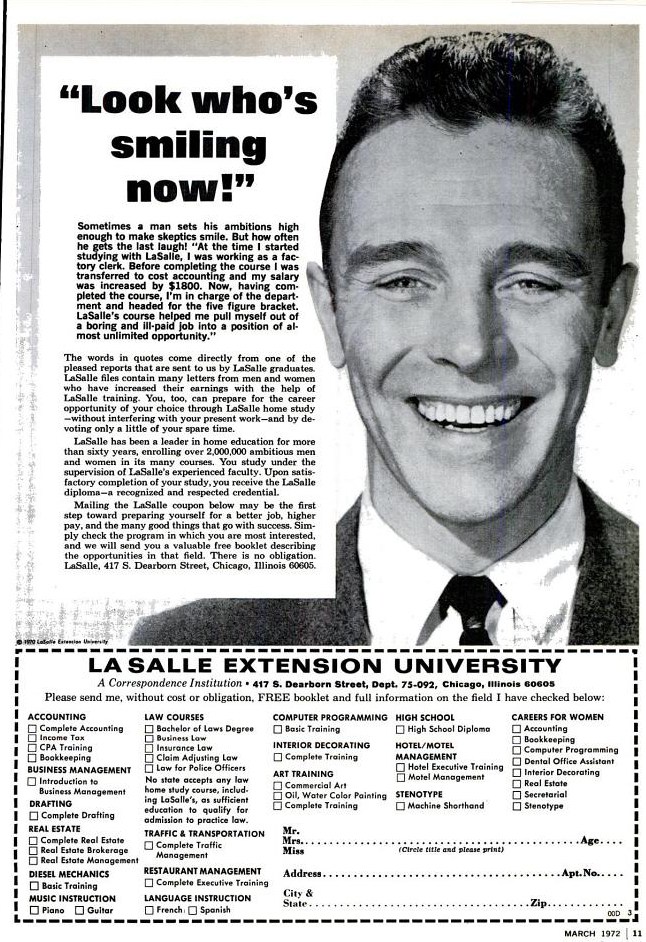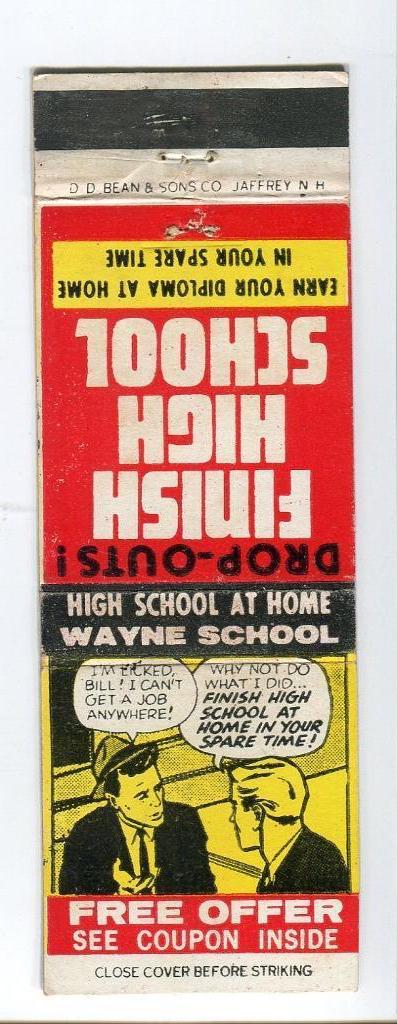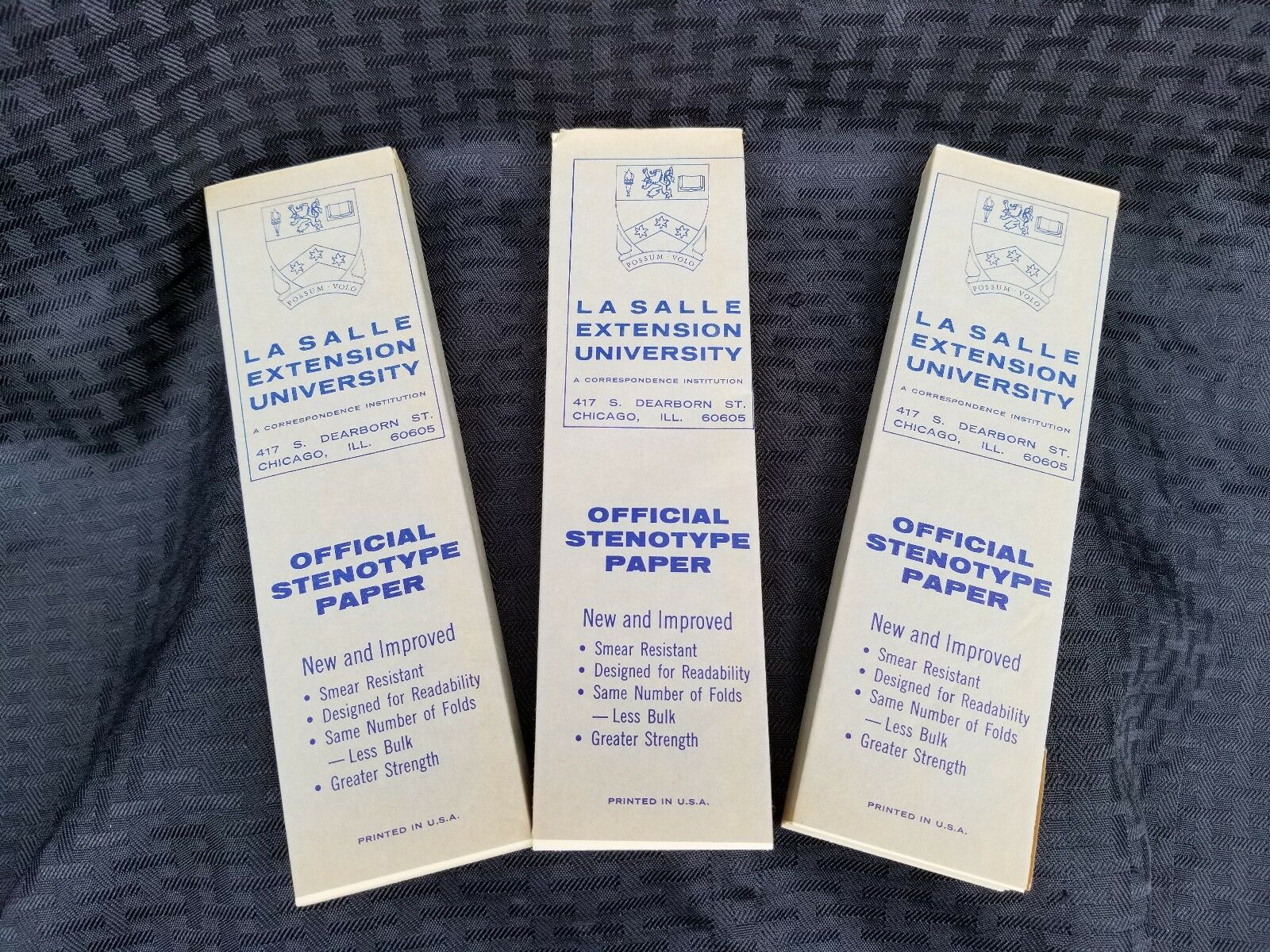By Steve Rhodes
This video was uploaded to YouTube this week and sent me down the rabbit hole of the late LaSalle Extension University (and its Wayne School subsidiary), described by Boing Boing as the “Snail Mail Generation’s University of Phoenix.” Only worse.
Let’s take a look.
*
“Correspondence schools took root in the United States after the University of Chicago began an innovative home study course for non-resident students,” Andrea James wrote for Boing Boing in 2010.
“This inspired copycat businesses, and the granddaddy of them all was La Salle Extension University. In 1908, founder J.G. Chapline set up offices a few blocks from University of Chicago and began trading on their good reputation, often running ads right next to theirs in Cosmopolitan, Pearson’s, National Geographic, Popular Mechanics, etc.
“LaSalle offered a valuable service that helped many people. In segregated America, LaSalle offered opportunities for many African-Americans who might have had problems matriculating at their local schools. Many hard-working people with full-time jobs, including future governors, congressmembers, and senators, obtained degrees from LaSalle.
“LaSalle’s most controversial program, their at-home bachelor’s degree in law, was their greatest success, but also led to their eventual downfall in 1979. Between its meteoric rise and its decline and fall, LaSalle became the template for both University of Phoenix-type distance learning schools and diploma mills.
“Like modern academia, a big part of the revenue involved selling overpriced books authored by instructors, so Chapline set up his own publishing company and recruited established authors to write textbooks. The result was remarkable. By the time the Federal Trade Commission stepped in during the 1970s to curb industry excesses like diploma mills, LaSalle had well over 100,000 active enrolled students and was clearing $75 million annually (over $440 million adjusted for inflation). Their aggressive direct response ad campaigns converted about 20% of inquiries.”
You should click through now and read the rest of James’ piece. I’ll wait.
*
Now, turn to James’ Flickr set of LaSalle’s ads. All that text – and yet hugely successful!
One example:

*
Then there were the matchbooks. For example, this one now for sale on eBay.

*
You can also buy official LaSalle steno paper on eBay.

*
LaSalle’s misdeeds were known years – including to the Tribune.
“In November 1973, Stars and Stripes, the military’s leading trade press publication, devoted 32 pages of coverage to a four-part investigative series on correspondence schools that marketed to GIs stationed in Europe,” New America notes.
“One giant correspondence school covered in the Stars and Stripes series, LaSalle Extension University, offered a law degree, an LLB, through home study courses and had some 10,000 of its 100,000 students enrolled in law courses.
“Dating back to 1937, LaSalle Extension University had run afoul of the Federal Trade Commission for its misleading advertising, especially advertisements that suggested the school’s bachelor of laws course would enable students to take and pass the bar exam.
“The FTC in the Nixon administration also thought it misleading to offer law degrees through mail-order courses, and in 1971 the FTC ordered LaSalle Extension to put a blunt disclaimer in all its advertisements for its law courses: ‘Completion of these courses does not qualify anyone to take the bar examination or practice law in any of the 50 states of the United States or the District of Columbia.’
“Just over half of the graduates of the university, which in 1974 was the biggest volume home study operation in the country, had gaps of at least 90 days between lesson submissions in their courses.
“For all of its permissive grading policies, LaSalle Extension had salespeople follow an aggressive five-step protocol to enroll students by manipulating the prospective applicant into thinking he had to ‘persuade you that he is qualified,’ despite having effectively no admission requirements.
“A Chicago Tribune reporter posing as a sales trainee was instructed by a LaSalle salesman that the carefully scripted ‘qualifying interview’ for prospective students was a critical sale closer: ‘Psychologically you have him following your orders right thru the qualifying interview so by the time you get to signing the contract he can’t go against you.’
“Some salesmen, Stars and Stripes found, were even recruiting servicemen on the way to Vietnam.”
*
The FTC finally put an end to LaSalle’s shenanigans in a 124-page order:
“This order requires a New York City publishing firm and its Chicago, Ill. subsidiary, LaSalle Extension University, among other things, to cease, in connection with the advertising and sale of correspondence courses, misrepresenting the school’s admission policy; the need or demand for graduates of their courses; the employment prospects and potential earnings available to them; and the requirements or qualifications necessary to obtain employment in their chosen fields.
“Advertisements containing any job or earnings claim must include a disclaimer stating that ‘Graduation from this course does not guarantee you will get a job;’ and testimonials which do not reflect the typical student experience must advise that the described experience is atypical.
“Further, if respondents represent to any prospective student that there is an employment demand for graduates of a relevant course, they must clearly and conspicuously disclose specified information regarding the vocation success rate of previous students.
“Additionally, respondents are prohibited from misrepresenting or failing to disclose material facts concerning a student’s financial obligations upon enrollment, and right to cancellation and refund.”
James: “Following further litigation, LaSalle finally folded in 1980.”
But their matchbooks and marketing materials live on.
–
Comments welcome.
Posted on April 30, 2019


